13 Best Herbal Teas For Fatigue
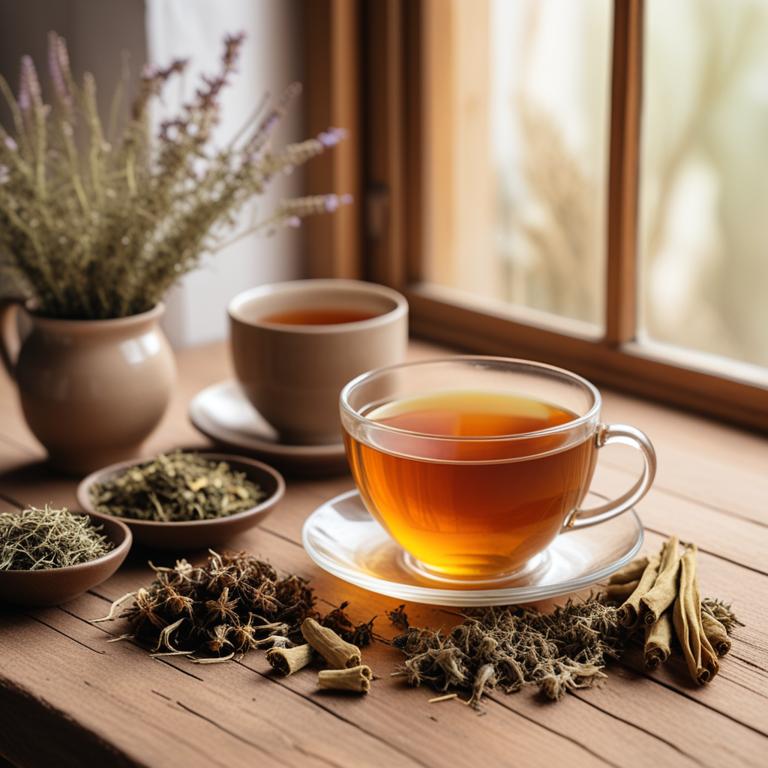
Herbal teas for fatigue are a type of herbal remedy that involves consuming tea made from various plant extracts to alleviate the symptoms of fatigue, which is a state of physical, mental, and emotional exhaustion.
These teas offer a natural and non-invasive approach to addressing fatigue, providing several benefits such as improved energy levels, reduced stress and anxiety, and enhanced overall well-being.
Some examples of herbal teas used to treat fatigue include peppermint tea, which helps to boost energy and alertness due to its invigorating scent, ginseng tea, which is believed to improve physical and mental stamina, and ashwagandha tea, which is known for its adaptogenic properties that help the body to cope with stress.
Additionally, other herbal teas such as ginger tea, licorice root tea, and yerba mate tea are also used to treat fatigue due to their warming and stimulating effects, as well as their ability to improve circulation and boost the immune system.
According to "Journal of the American Nutrition Association", teas for fatigue contain polyphenolic compounds, such as catechins and epicatechins, as well as L-theanine, which may help alleviate fatigue due to their antioxidant, anti-inflammatory, and neuroprotective effects.
Below there's a list of the 13 best herbal teas for fatigue.
- 1. Panax ginseng teas
- 2. Ginkgo biloba teas
- 3. Eleutherococcus senticosus teas
- 4. Zingiber officinale teas
- 5. Valeriana officinalis teas
- 6. Celastrus paniculatus teas
- 7. Centella asiatica teas
- 8. Schisandra chinensis teas
- 9. Withania somnifera teas
- 10. Curcuma longa teas
- 11. Matricaria chamomilla teas
- 12. Bacopa monnieri teas
- 13. Ocimum sanctum teas
Also you may be interested in...
TODAY'S FREE BOUNDLE
Herb Drying Checklist + Herbal Tea Shopping List + Medicinal Herbs Flashcards
Enter you best email address below to receive this bundle (3 product valued $19.95) for FREE + exclusive access to The Aphotecary Letter.
$19.95 -> $0.00
1. Panax ginseng teas

Panax ginseng teas have been traditionally used to treat fatigue, a common ailment characterized by feelings of exhaustion and lack of energy.
The properties of this herbal preparation, including its adaptogenic and antioxidant properties, help to treat fatigue by enhancing physical and mental performance, reducing oxidative stress, and promoting overall well-being.
The bioactive constituents of Panax ginseng teas, such as ginsenosides, panaxans, and polysaccharides, play a crucial role in treating fatigue by modulating the body's stress response, improving blood flow, and boosting energy metabolism.
Regular consumption of Panax ginseng teas has been shown to provide benefits such as improved endurance, enhanced cognitive function, and reduced fatigue, making it a popular natural remedy for individuals suffering from this ailment.
Related Study
According to the information provided, Panax ginseng teas for fatigue may have beneficial effects due to the antioxidant and organ-protective actions of ginseng, particularly the enhanced nitric oxide (NO) synthesis in the endothelium, which could contribute to vasodilatation and potentially alleviate fatigue.
2. Ginkgo biloba teas

Ginkgo biloba teas have been used for centuries to treat fatigue, a common ailment characterized by a lack of energy and motivation.
The properties of this herbal preparation, including its antioxidant and anti-inflammatory properties, help to treat fatigue by improving blood circulation and reducing oxidative stress.
The bioactive constituents of Ginkgo biloba tea, such as flavonoids and terpenoids, specifically flavone glycosides and bilobalide, help to increase oxygenation to the brain and other organs, thereby alleviating fatigue.
The benefits of consuming Ginkgo biloba tea to treat fatigue include improved mental clarity, increased energy levels, and enhanced overall well-being, making it a popular natural remedy for this ailment.
Related Study
According to "Pharmacopsychiatry", Ginkgo biloba teas for fatigue may be beneficial as they have been shown to improve sleep continuity and enhance Non-REM sleep due to a weakening of tonic CRH-activity.
3. Eleutherococcus senticosus teas
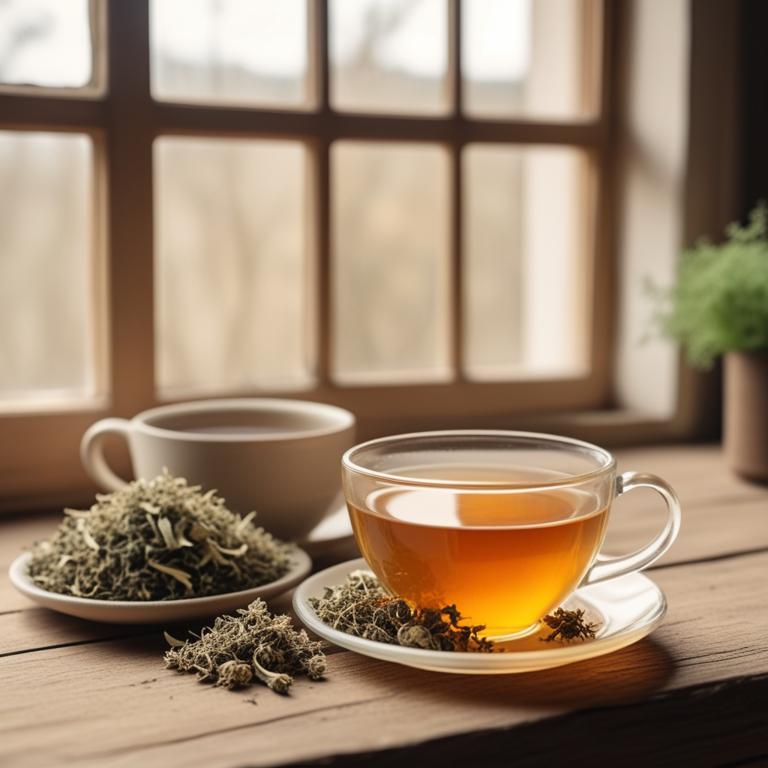
Eleutherococcus senticosus teas have been traditionally used to treat fatigue and its associated symptoms due to their adaptogenic properties, which help the body adapt to physical and mental stress.
The bioactive constituents of this herbal preparation, including eleutherosides and lignans, work together to increase the body's resilience and ability to cope with fatigue.
These compounds help to enhance the body's natural antioxidant defenses, reduce inflammation, and improve cardiovascular function, all of which contribute to the alleviation of fatigue.
By using Eleutherococcus senticosus teas, individuals can benefit from improved physical performance, enhanced mental clarity, and a reduced risk of developing chronic fatigue syndrome.
Related Study
According to "Phytomedicine : international journal of phytotherapy and phytopharmacology", Eleutherococcus senticosus teas for fatigue can increase endurance and resistance to stress, as seen in a study where mice treated with a combination of Eleutherococcus senticosus extracts showed a seven-fold increase in time to exhaustion after forced swimming.
4. Zingiber officinale teas

Zingiber officinale teas have been traditionally used to treat fatigue, a common ailment characterized by a feeling of exhaustion and lack of energy.
The bioactive constituents of Zingiber officinale teas, such as gingerols and shogaols, help to treat fatigue by increasing circulation, reducing inflammation, and improving digestion.
These properties help to alleviate fatigue by providing a natural energy boost, improving mental clarity, and enhancing overall physical and mental well-being.
The benefits of using Zingiber officinale teas to treat fatigue include improved endurance, increased vitality, and a reduced risk of chronic diseases associated with fatigue.
Related Study
According to "Frontiers in pharmacology", Zingiber officinale teas for fatigue may not be directly mentioned in the study, however, it does mention the benefits of another Zingiber officinale-based Kampo medicine, Hochuekkito, which showed significant improvement in fatigue in patients with genitourinary cancer, as well as overall improvement in patients with chronic fatigue syndrome.
5. Valeriana officinalis teas

Valeriana officinalis teas have been traditionally used to treat fatigue, a common ailment characterized by physical, mental, or emotional exhaustion.
The sedative properties of Valeriana officinalis teas help to treat fatigue by promoting relaxation, reducing anxiety, and improving sleep quality, thereby alleviating the symptoms of fatigue.
The bioactive constituents of Valeriana officinalis teas, including valerenic acid, valeranone, and isovaleric acid, contribute to its therapeutic effects by interacting with the GABA receptors in the brain, which helps to reduce stress and promote a sense of calmness.
The benefits of Valeriana officinalis teas in treating fatigue include improved sleep patterns, reduced anxiety and stress levels, and enhanced overall well-being, making it a popular natural remedy for individuals suffering from fatigue.
Related Study
According to "Pharmacopsychiatry", Valeriana officinalis teas for fatigue may be beneficial as they have been found to improve sleep structure and sleep perception in patients with mild psychophysiological insomnia, particularly in increasing sleep efficiency, slow-wave sleep, and reducing subjective sleep latency.
6. Celastrus paniculatus teas

Celastrus paniculatus teas, also known as Malkangani, are a traditional herbal preparation used to treat fatigue, a common ailment characterized by physical or mental exhaustion.
The properties of this herbal preparation help to treat fatigue by improving cognitive function, reducing stress, and promoting overall well-being.
The bioactive constituents of Celastrus paniculatus teas, including alkaloids, glycosides, and flavonoids, contribute to their therapeutic effects by modulating neurotransmitter activity, enhancing energy production, and protecting against oxidative stress.
The benefits of using Celastrus paniculatus teas to treat fatigue include improved mental clarity, increased energy levels, and enhanced overall quality of life.
7. Centella asiatica teas
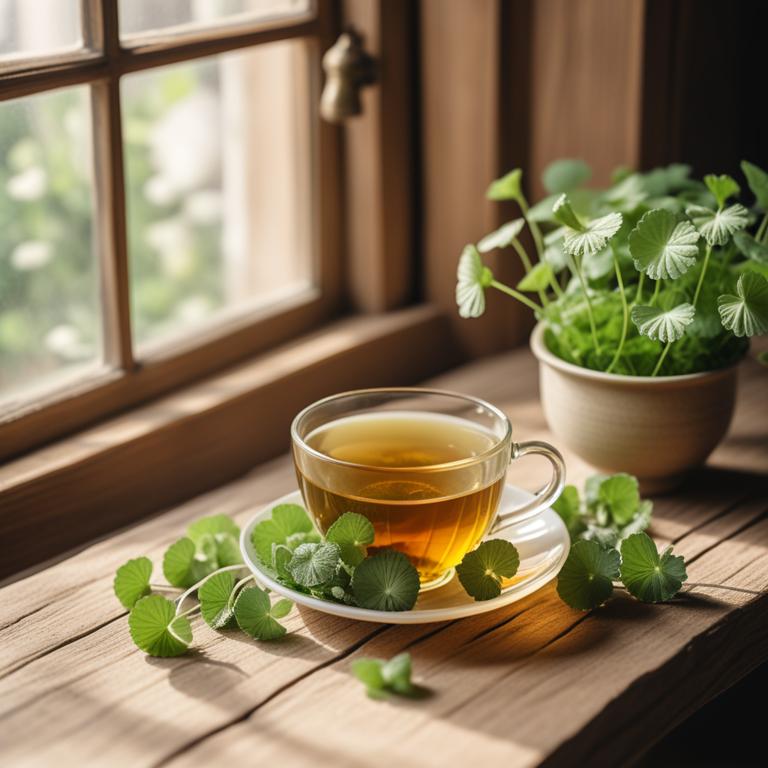
Centella asiatica teas have been traditionally used to treat fatigue and promote overall well-being, thanks to their adaptogenic properties that help the body adapt to stress and promote balance.
The herbal preparation contains bioactive constituents such as asiatic acid and madecassoside, which have anti-inflammatory and antioxidant effects that help to reduce fatigue and improve energy levels.
By reducing oxidative stress and inflammation, Centella asiatica teas help to alleviate fatigue and promote a sense of rejuvenation and vitality.
Regular consumption of Centella asiatica teas has been shown to provide numerous benefits, including improved mental clarity, enhanced physical performance, and a reduced risk of fatigue-related disorders.
8. Schisandra chinensis teas
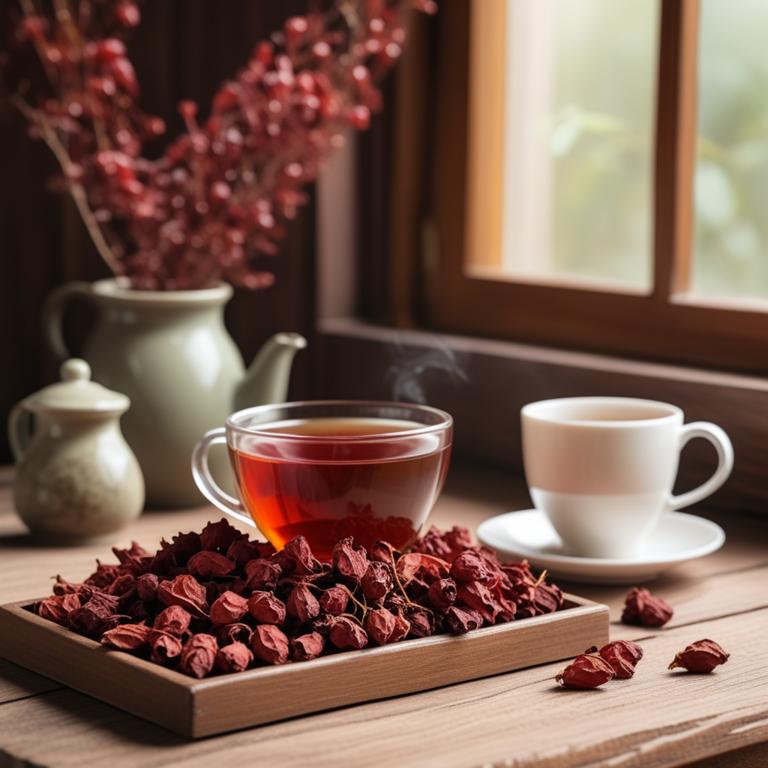
Schisandra chinensis teas have been traditionally used to treat fatigue due to their adaptogenic properties, which help to regulate energy levels and promote overall well-being.
The bioactive constituents of this herbal preparation, including schisandrins, lignans, and phenolic acids, work together to reduce oxidative stress and inflammation, alleviating fatigue symptoms.
By enhancing mitochondrial function and improving antioxidant defenses, Schisandra chinensis teas help to restore energy and vitality, making it an effective remedy for fatigue.
Regular consumption of Schisandra chinensis teas has been associated with improved physical and mental performance, enhanced endurance, and reduced fatigue, making it a valuable natural supplement for individuals experiencing fatigue.
Related Study
According to "Phytomedicine : international journal of phytotherapy and phytopharmacology", Schisandra chinensis teas have been shown to have anti-fatigue properties, indicating their potential use in addressing fatigue.
9. Withania somnifera teas
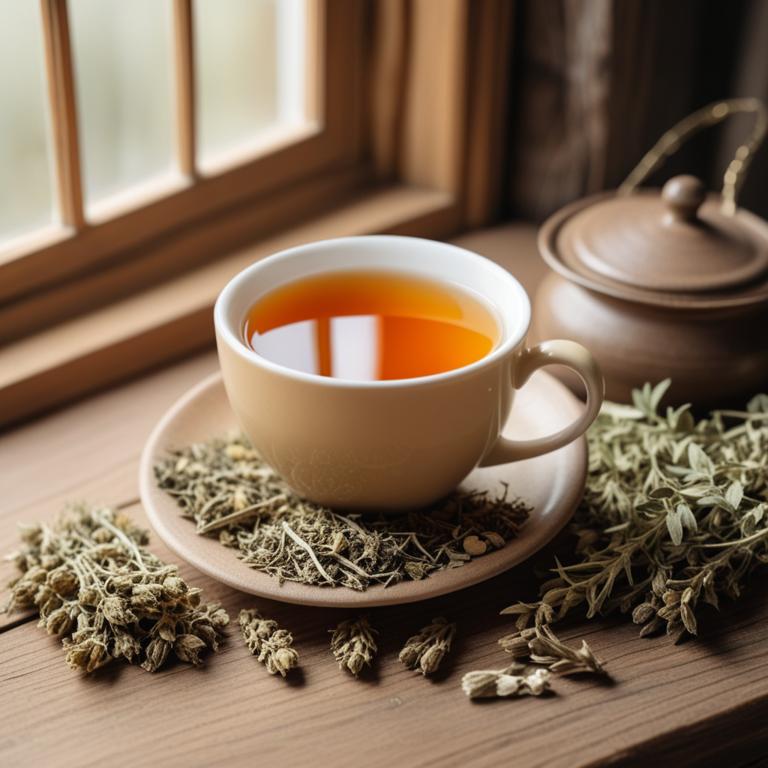
Withania somnifera teas, derived from the root of the ashwagandha plant, have been traditionally used to treat fatigue and its associated symptoms.
The bioactive constituents, including withanolides and alkaloids, possess adaptogenic properties that help to normalize the body's physiological response to stress, thereby alleviating fatigue.
By regulating the body's cortisol levels and improving sleep quality, this herbal preparation helps to reduce fatigue and promote overall well-being.
The benefits of Withania somnifera teas in treating fatigue include enhanced physical and mental performance, improved mood, and increased energy levels, making it a popular natural remedy for individuals seeking to manage fatigue and stress.
Related Study
According to "International journal of Ayurveda research", Withania somnifera teas for fatigue may be useful for generalized weakness and to improve speed and lower limb muscular strength.
10. Curcuma longa teas

Curcuma longa teas have been traditionally used to treat fatigue, a common ailment characterized by physical and mental exhaustion.
The anti-inflammatory and antioxidant properties of Curcuma longa teas help to treat fatigue by reducing inflammation and oxidative stress, which are often contributing factors to this condition.
The bioactive constituents of Curcuma longa, including curcumin, demethoxycurcumin, and bisdemethoxycurcumin, have been shown to have a positive impact on fatigue by inhibiting the production of pro-inflammatory enzymes and improving mitochondrial function.
The benefits of using Curcuma longa teas to treat fatigue include improved energy levels, enhanced cognitive function, and a reduction in symptoms of depression and anxiety.
Related Study
According to "Journal of cachexia, sarcopenia and muscle", Curcuma longa teas for fatigue may have a beneficial effect due to the presence of curcumin, which has shown substantial beneficial effects on physical performance, including reduced muscle fatigue, in previous clinical studies.
11. Matricaria chamomilla teas
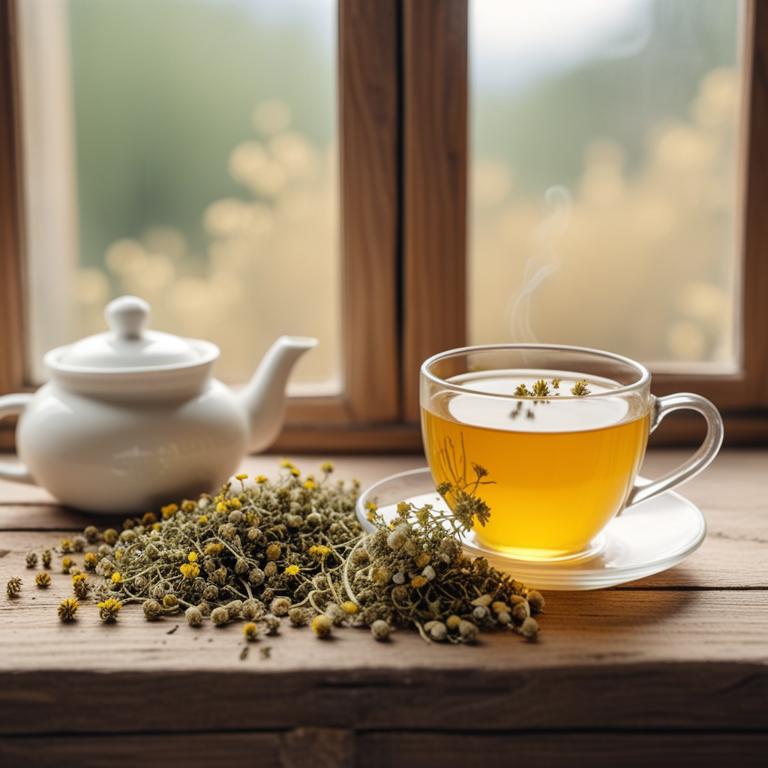
Matricaria chamomilla teas have been traditionally used to treat fatigue, a common ailment characterized by physical, mental, or emotional exhaustion.
The herbal preparation exhibits adaptogenic properties, helping the body to cope with stress and promote overall well-being, thereby alleviating fatigue.
The bioactive constituents of Matricaria chamomilla teas, including apigenin and luteolin, contribute to its anti-inflammatory and antioxidant effects, which help to reduce fatigue and improve sleep quality.
The benefits of Matricaria chamomilla teas in treating fatigue include reduced stress levels, improved mood, and enhanced physical performance, making it a popular natural remedy for individuals seeking a holistic approach to managing fatigue.
Related Study
According to the study, Matricaria chamomilla teas are used by herbalists in the north-central region of Morocco to treat asthenia, which is a condition related to fatigue.
12. Bacopa monnieri teas
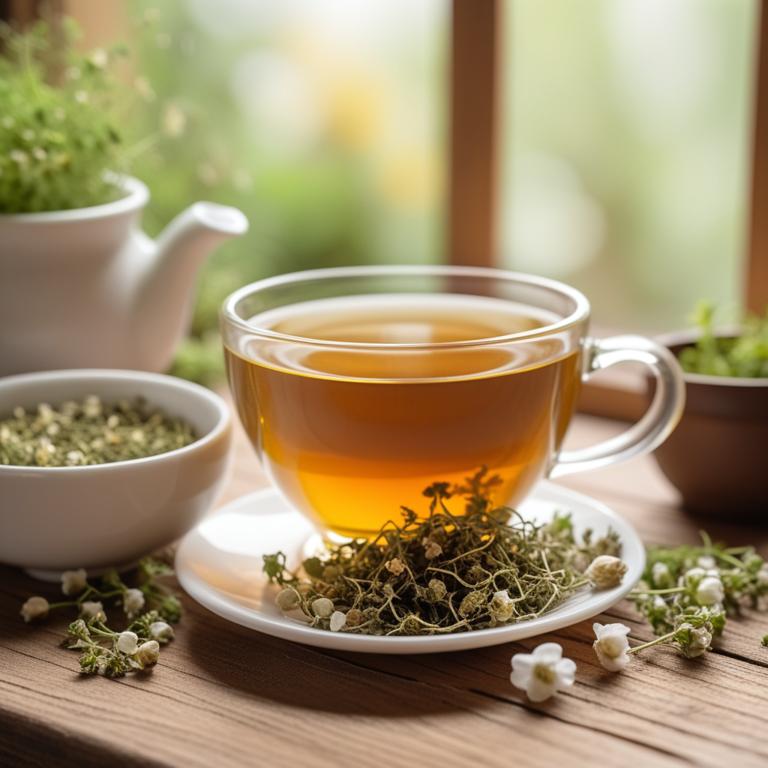
Bacopa monnieri teas have been traditionally used to treat fatigue, and its properties make it an effective herbal preparation for alleviating this ailment.
The antioxidant and anti-inflammatory properties of Bacopa monnieri teas help to treat fatigue by reducing oxidative stress and inflammation in the body.
The bioactive constituents of Bacopa monnieri teas, such as bacosides and saponins, help to improve cognitive function, memory, and mood, which can contribute to feelings of fatigue.
By promoting a sense of calm and reducing mental exhaustion, Bacopa monnieri teas can provide benefits such as improved mental clarity, enhanced focus, and increased energy levels, making it a popular natural remedy for fatigue.
Related Study
According to "Pharmacology, biochemistry, and behavior", Bacopa monnieri teas may have antifatigue properties, as evidenced by the study on Gamisipjundaebo-tang (GSDBT), which showed reduced immobility time and improved blood biochemical parameters related to fatigue in mice.
13. Ocimum sanctum teas

Ocimum sanctum teas, also known as holy basil tea, have been traditionally used to treat fatigue ailments due to their adaptogenic and antioxidant properties.
The bioactive constituents, including eugenol and ursolic acid, help to reduce oxidative stress and inflammation, thereby alleviating fatigue.
This herbal preparation helps to treat fatigue by promoting relaxation, reducing stress levels, and improving sleep quality.
The benefits of using Ocimum sanctum teas to treat fatigue include improved mental clarity, reduced muscle weakness, and enhanced overall well-being.
Related Study
According to "Frontiers in pharmacology", Ocimum sanctum teas for fatigue using multi-component extracts of medicinal plants such as Hochuekkito, Juzentaihoto, and Rikkunshito have shown efficacy in improving fatigue in patients with various conditions, including genitourinary cancer, chronic fatigue syndrome, and geriatric cachexia, with significant improvements reported within 2-16 weeks of therapy.